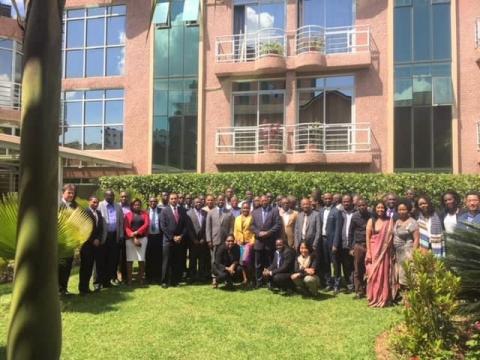
From 12 to 13 June 2018, 14 countries, regional associations and development institutions from across Africa met in Kigali, Rwanda to deliberate on the capacity imperatives needed to evaluate SDGs implementation and track progress at country level. Opening and welcome remarks by Indran Naidoo, Director, Independent Evaluation Office, UNDP and Lamin Manneh, Director, UNDP Regional Service Center for Africa, set the tone for the conference.
The two-day conference shared various experiences and insights via presentations by national Monitoring and Evaluation champions (Benin, Ghana, Kenya, Rwanda, Senegal, South Africa, Uganda), regional associations / networks (The African Evaluation Association (AfrEA), le Réseau francophone de l’évaluation (RFE), the SDG Center) and from the Independent Evaluation units at the African Development Bank and the United Nations Development Program. Noteworthy topics discussed at length during the dialogue forum included the threats, opportunities and possibilities confronting countries as they strive to evaluate and track their SDG targets.
Kobena Hanson, Principal Evaluation Capacity Development Officer, represented Independent Development Evaluation (IDEV) at the African Development Bank, and delivered a presentation on IDEV's work to support and promote evaluation capacity development across the continent. The presentation highlighted IDEV’s ongoing support to, and work in, enhancing and advancing the use of M&E evidence and promoting an evaluative culture and good governance on the continent via initiatives such as Strengthening National Evaluation Systems (SNES), the African Parliamentarians’ Network on Development Evaluation (APNODE), the Evaluation Platform for Regional African Development Institutions (EPRADI) and Twende Mbele as well as its collaborations with the Centre for Learning on Evaluation and Results for Anglophone Africa (CLEAR-AA), RFE, UN-Women, and EvalPartners.

Conference participants agreed to continue the dialogue and ongoing efforts post-Kigali. Key take-aways from the forum included the need for delocalization; embedding evaluation in national constitutions; data generation and collection with non-state actors; investing in administrative data; and an enhanced high level commitment to ongoing efforts.
Related documents

